Articles in this Cluster
23-06-2025
NPR outlines five political implications of President Trump’s decision to strike Iran’s nuclear facilities. First, it tests his pledge to end “forever wars,” making containment crucial to avoid a prolonged conflict that could alienate parts of his base. Second, the true effectiveness of the strikes remains uncertain; while Trump claims “monumental” damage, independent analysts suggest key elements may have survived, and public skepticism demands clear proof. Third, Iran’s likely retaliation could carry significant political costs if Americans are harmed, amid heightened global and domestic security alerts. Fourth, the move raises questions about Trump’s broader foreign policy—balancing his “peace deals” rhetoric with a show of strength and possible pressure from Israel. Finally, while some in Congress seek tighter authorization requirements for such actions, partisan dynamics make new constraints unlikely; legality debates could backfire politically for Democrats unless the strikes are seen as ineffective or overreaching.
Entities: Donald Trump, Iran, NPR, U.S. strike on Iran, forever wars • Tone: analytical • Sentiment: neutral • Intent: analyze
23-06-2025
The Constitution assigns Congress the power to declare war and the president the role of commander in chief, creating enduring tension over initiating hostilities. Experts note the framers intended Congress to decide on war, but presidents have often used force without formal declarations, especially post–World War II due to faster military realities and the UN framework. Legislative approval can come through authorizations for use of military force (AUMFs), not just declarations. The War Powers Resolution of 1973 aims to ensure joint decision-making by requiring notification within 48 hours and authorization within 60 days, but presidents frequently sidestep its spirit by informing rather than meaningfully consulting Congress. Critics argue recent strikes on Iran without prior congressional approval violate constitutional limits absent self-defense or imminent threat, while the administration gestures toward War Powers compliance. The result is an ongoing, unresolved struggle over war powers between the branches.
Entities: U.S. Constitution, Congress, President, War Powers Resolution of 1973, Authorizations for Use of Military Force (AUMFs) • Tone: analytical • Sentiment: neutral • Intent: analyze
23-06-2025
The White House said it made bipartisan courtesy calls to congressional leaders before U.S. airstrikes in Iran, but claimed House Minority Leader Hakeem Jeffries didn’t answer. Press Secretary Karoline Leavitt called reports that Democrats weren’t notified “false,” asserting the administration wasn’t obligated to brief them in advance. Jeffries and Senate Democratic Leader Chuck Schumer reportedly received minimal, no-details notifications, and Jeffries criticized the lack of rationale or briefing. Some Democratic intelligence leaders said they weren’t notified at all. The White House defended the strikes as within the president’s Article II authority and accused Democrats of politicizing the issue, while Rep. Thomas Massie and others argued Congress should have been consulted. President Trump praised the strikes on Iran’s nuclear facilities.
Entities: White House, Hakeem Jeffries, Karoline Leavitt, Chuck Schumer, U.S. airstrikes in Iran • Tone: analytical • Sentiment: neutral • Intent: inform
23-06-2025
President Trump’s unilateral strikes on three major Iranian nuclear sites, justified by the White House as limited actions under Article II for U.S. security and Israel’s defense, have ignited a sharp war powers fight in Congress that crosses party lines. Republican leaders largely back Trump and oppose votes to reassert congressional authority, while some right-wing Republicans like Thomas Massie and Marjorie Taylor Greene criticize the move as unconstitutional or influenced by “neocons.” Democrats are split: leaders like Hakeem Jeffries and Chuck Schumer demand briefings and insist offensive force requires congressional approval, and Senator Tim Kaine is pushing a vote to curb executive power and revoke old AUMFs; others, including John Fetterman and Steny Hoyer, praise the strikes as appropriate and necessary to prevent a nuclear-armed Iran. The debate intensified amid reports of Iranian retaliation on a U.S. base and Trump’s unconfirmed claim of an Iran-Israel cease-fire, which could minimize immediate congressional action.
Entities: Donald Trump, Iran, U.S. Congress, Article II, AUMF • Tone: analytical • Sentiment: neutral • Intent: inform
23-06-2025
President Trump announced a phased ceasefire between Iran and Israel, saying Iran would halt attacks first, followed 12 hours later by Israel, and declaring the war “ended” after another 12 hours. Iran’s foreign minister indicated Tehran would stop military operations if Israel did too, though Israel did not immediately confirm and kept civilian restrictions in place. Despite the announcement, Iran launched multiple missile barrages at Israel early Tuesday, killing at least four people, and Israel struck missile launchers in western Tehran, with explosions reported in the capital. Trump downplayed an earlier Iranian strike on a U.S. base in Qatar as “very weak,” with no casualties. U.S. officials said the ceasefire blueprint emerged from Iranian signals they’d discuss their nuclear program if Israeli strikes stopped, with coordination involving Trump, Vice President JD Vance, and Qatari leaders. Meanwhile, House Democratic leaders introduced a War Powers Resolution to limit further escalation without congressional approval.
Entities: Donald Trump, Iran, Israel, Tehran, JD Vance • Tone: urgent • Sentiment: negative • Intent: inform
